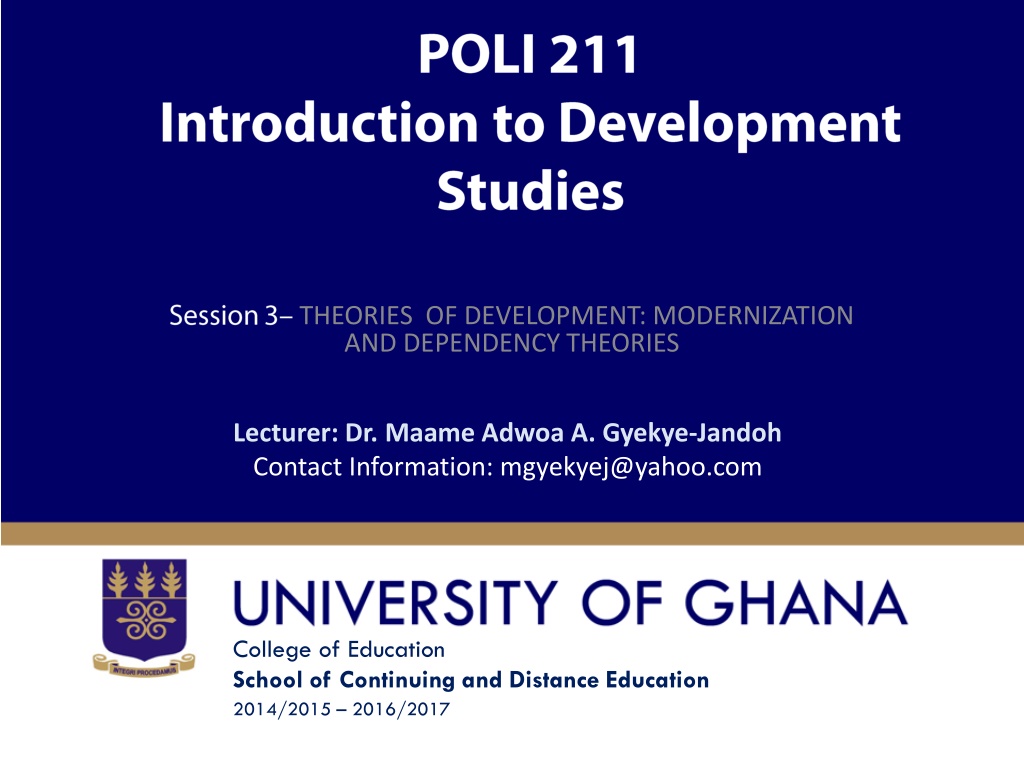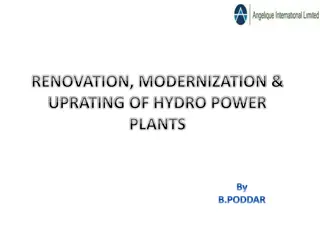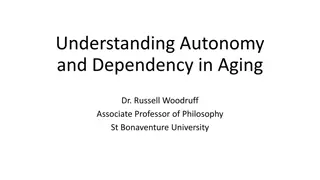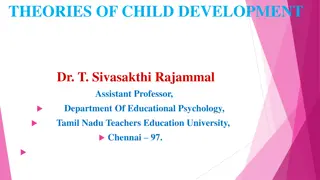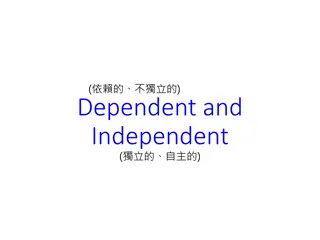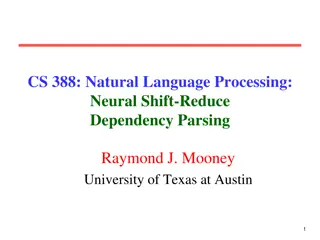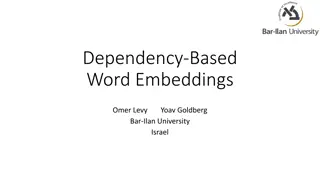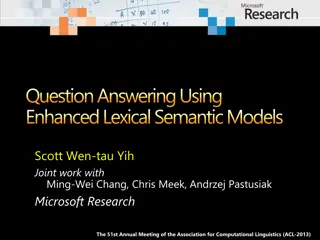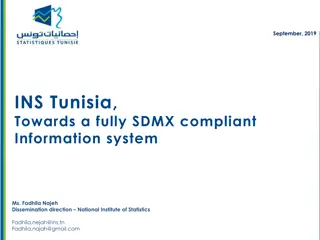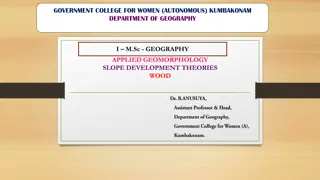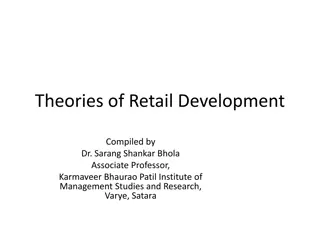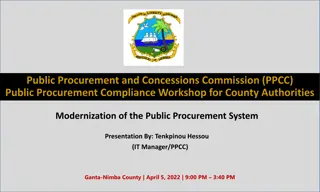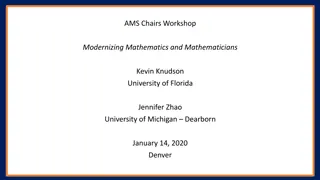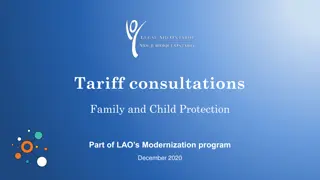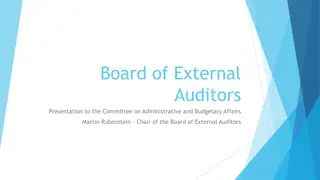Understanding Development Theories: Modernization and Dependency
In this course on theories of development, students delve into Modernization Theory and Dependency Theory, exploring their key components, critiques, and implications. Through the lens of renowned sociologists, the course examines the transition from traditional to modern societies and its impact on development. Essential readings and discussions shed light on the complexities of global development paradigms.
Download Presentation

Please find below an Image/Link to download the presentation.
The content on the website is provided AS IS for your information and personal use only. It may not be sold, licensed, or shared on other websites without obtaining consent from the author. Download presentation by click this link. If you encounter any issues during the download, it is possible that the publisher has removed the file from their server.
E N D
Presentation Transcript
THEORIES OF DEVELOPMENT: MODERNIZATION AND DEPENDENCY THEORIES Lecturer: Dr. Maame Adwoa A. Gyekye-Jandoh Contact Information: mgyekyej@yahoo.com College of Education School of Continuing and Distance Education 2014/2015 2016/2017
Session Overview Overview In Sessions 1 and 2, the student was introduced to the varied meanings of development, the development debate, as well as the relevance of Development Studies. In this session, the student will be made familiar with the major theories of development. He/she will learn about the Modernization Theory, the Dependency Theory, and the critiques of, or good and bad things about, them. Slide 2
Session Outline The key topics to be covered in the session are as follows: Topic One: Modernization Theory Topic Two: Critique of Modernization Theory Topic Three: Dependency Theory Topic Four: Critique of Dependency Theory Slide 3
Reading List Andrew Webster (1984). Theories of Underdevelopment , In Introduction to the Sociology of Development. London: Macmillan Publishers. Modernization Theory In Introduction to the Sociology of Development. London: Macmillan Publishers. Frank, Andre G. 1966. The Development of Underdevelopment. In Development Studies: A Reader, by Stuart Corbridge. ed. 1995. p. 27-37. London: Arnold. Frank, Andre G. 1981.Reflections on the World Economic Crisis. Slide 4
Topic One MODERNIZATION THEORY Slide 5
Modernization Theory Modernization Theory and the Tradition vs. Modernity Argument The theory drew on the tradition-modernity distinction made by classical sociologists like Emile Durkheim and Max Weber to explain why some countries were developed and others were not. Thus, modernization theory placed most emphasis on the values and norms of the two types of society and their economic systems the traditional society and the modern society. 1. argued that the transition (or change) from the limited economic relationships of traditional society to the innovative, complex economic associations of modernity depended on a prior change in the values, attitudes, and norms of people. Development, in this view, then depends on the replacement of traditional, primitive values with modern ones. Slide 6
Modernization Theory Features of Traditional Society Modernization theorists singled out three crucial features of what they call the traditional society, and three crucial features of the modern society. 1. In the traditional society, the value of traditionalism is dominant people are oriented to the past and lack the cultural ability to adjust to new circumstances. 2. The kinship system is the deciding factor for all social practices economic, political, and legal relationships are controlled through this system. This means therefore that one s position in the kinship system and hence society is ascribed, not achieved. 3. Members in traditional society have an emotional, superstitious, and fatalistic approach to the world. This means that members may give up on trying to change life for the better because they believe this is how things should be, or that some supernatural power has made things the way they are. Slide 7
Modernization Theory Features of Modern Society 3 Features of Modern Society: 1. People are not slaves to the traditions they may still have, and will challenge any that seem unnecessary and that hinder progress. 2. Kinship plays much less of an important role in all areas of society due to geographic and social mobility which weakens family ties. Here, one s position in the economy and society is earned through hard work and achievement-motivation rather than through kinship. 3. In the modern society, members are not fatalistic, but are forward-looking and innovative, ready to overcome the obstacles they find in their way. Members also have a strong entrepreneurial spirit and rational, scientific approach to the world. Slide 8
Sample Questions How is modern society different from traditional society, according to modernization theorists? What are three crucial features of a traditional society that make it underdeveloped, according to modernization theory? Slide 9
Modernization Theorists and their Arguments Let us take a look at three major modernization theorists and the arguments they have made Talcott Parsons, Daniel Lerner, and Walter Rostow. 1. Talcott Parsons (1951), argued that an achievement orientation is a much more rational criterion for decision- making on the allocation of jobs and rewards. 2. Lerner (1964), argued that a transitional society exists, which has been exposed to modernity through the process of cultural diffusion from more advanced sectors of the world. Lerner identified an intervening stage between traditional and modern societies known as the transitional society. Slide 10
Modernization Theorists and their Arguments continued 3. Walter Rostow (1960), in his stage model, identified five stages for economic development. These five stages were derived from his analysis of the British industrial revolution. They are the traditional society; the preconditions for take-off (to industrialize); take-off (actually industrializing); the drive to maturity (where industry and services are the basis of the economy); and the age of high mass-consumption (where more people are in the middle class and can afford to purchase/consume more and more). Slide 11
Modernization Theory continued Note that: entrepreneurial ambition, combined with sustained capital accumulation and investment, are two of the principal forces of development as seen by most modernization theorists. Modernization theory gives the greatest priority to the role played by people s values, norms, and beliefs in determining whether they create traditional or modern societies. Changes in values are the most important conditions for social change. Therefore, different societies are at different stages of development because they have been more or less successful in introducing the features of modernity. Slide 12
Topic Two CRITIQUE OF MODERNIZATION THEORY Slide 13
Critique of Modernization Theory Modernization theory played a huge policy role for many years the injection of capital to aid both industrial take-off and commercialization of agriculture; the training of an entrepreneurial class; the expansion of educational programs; and assistance to only countries that are democratic . Despite this, there have been several criticisms of the modernization theory, 1. Critics argue that the traditional and the modern , principal terms of the theory, are too vague and do not recognize the great variety of societies that have and do exist. The traditional label, they say, has been used as a blanket term to cover a range of pre-industrial societies. 2. There is little explanation about the actual way by which societies develop, except some reference to the need for forward looking attitudes and healthy economic motivation. Slide 14
Critique of Modernization Theory 3. Some critics ask: Are traditional and modern really so mutually exclusive? That is do they really exist cleanly apart from each other? There is much evidence to show that economic growth and modernity do not necessarily mean that so-called traditional patterns of action, values, or beliefs have been abandoned or no longer exist. For example, modern technology has helped Islam to simplify the visit to Mecca. Slide 15
Critique of Modernization Theory continued 4. Questions the modernization argument that as industrialization and urbanization develop, the wider kinship system is weakened as people become more concerned with their own nuclear family. Modernization does not completely undermine the value of extended family ties; rather, these family ties are modified or sustained differently from the period before urbanization. For example, in many African societies, extended family ties are modified, but still rather help modernized members by holding the fort at home 5. The essential weakness of the tradition-modernity thesis is that it persists in making generalizations that such and such will happen without checking the historical or current evidence. Slide 16
Critique of Modernization Theory continued 6. Finally, the most forceful criticism of modernization theory is that it ignores entirely the impact of colonialism and imperialism on developing countries. For example, colonial history is not discussed in any of Talcott Parsons works on evolution. This omission is also a failure to acknowledge that economic growth is as much about the power to control resources as it is about the ambition to do so. Critics assert that elites or upper classes have the power to impose the division of labor on subordinates, determining the reward for and control over the work task (Webster 1987). Slide 17
Question to Consider Question: Choose one major criticism of modernization theory discussed, and analytically state why you agree or disagree with it. Slide 18
Topic Three DEPENDENCY THEORY Slide 19
Dependency Theory It is another theory of development that seeks to explain why some countries in the world are developed and more importantly why many other countries are underdeveloped or still developing. It originated and became dominant in the 1960s, through the works of scholars and development economists who were very concerned with the continuing economic failure and poverty in many Latin American countries. General Arguments: 1. Dependency theorists dismissed the notions of modernization theory that a lack of development could be caused by inappropriate or inadequate adoption of modernizing values, as well as by zero or insufficient developing country exposure to advanced industrial countries of the world (Webster 1984). Slide 20
Dependency Theory General Arguments 2. Rather, dependency theorists argued that the persistent and great poverty in countries like Argentina, Peru, Chile, and Brazil was caused by exposure to the economic and political influences of the advanced countries.. 3. The theory completely rejected the view that advanced societies could have a progressive impact on less developed countries leading them to develop. On the contrary, it argued emphatically that the growth of the advanced industrial countries of the world meant the simultaneous underdevelopment of the less developed countries whose economic surplus was exploited by the West. Slide 21
Andre Gunder Franks Dependency Theory Arguments 4. As long as poor societies are victims of Western economic imperialism and dominance, their poverty will persist (Webster 1984). What was the major concern of scholars who originated dependency theory in the 1960s? Andre Gunder Frank s Theory of Dependency Andre Gunder Frank is the scholar that is most closely associated with the view that the persistent poverty of less developed countries is a reflection of their dependency. 1. He argued, that the experience of colonialism and merchant capitalism in most developing countries forced a specialization of production of a few crops on less developed countries that was primarily export-oriented and calculated to meet the raw material needs of the colonial powers. Slide 22
Andre Gunder Franks Dependency Theory Arguments 2. The elites of these poor countries were incorporated or brought into this system of production and could therefore do very little to put into place a more diversified and independent economic system. These elites became the mere middlemen between the rich buyers and the poor peasant producers/farmers, the comprador or compromised class, whose wealth and lifestyles were tied more and more to and very heavily dependent on the activities of the economic elite in the metropolitan countries. 3. Third, he argued that while the elites in the poor developing countries (or satellites) enjoy a high standard of living from their relationship with the economic elites of rich countries, the masses experience a chronic deprivation as their surplus production is taken from them in the local rural areas and transferred to the rich farmers and businessmen in their countries and then on abroad. Slide 23
Andre Gunder Franks Dependency Theory Arguments continued 4. Because of this, there is a chain of dependency that runs down from the highly advanced nations of the world, through which the economic surplus is passed upwards within a nation and then internationally (Frank 1967). The elites of the satellite countries have therefore become dependent on those of the metropole/metropolitan countries and do not look after the interests of their own country masses. Slide 24
Andre Gunder Franks Dependency Theory conclusion Therefore, the only way to stop the exploitation of this surplus is to break the chain of dependency by which the surplus is transferred. Frank thought that it is only a socialist revolution by the working class in developing countries that can remove the comprador elite, thereby breaking the weak link in the chain of dependency (Webster 1984). Slide 25
Topic Four CRITIQUE OF DEPENDENCY THEORY Slide 26
Critique of Dependency Theory 1. Some critics argue that the concept of dependency is itself too vague to be of use, and that Frank fails to sufficiently clarify the sense in which less developed countries are dependent on metropolitan/advanced countries. The criticism is that there is nothing in Frank s argument that makes dependency peculiar to developing countries. 2. Frank s earlier work appears to argue that developing countries are static. As the surplus is sucked out of such countries, no indigenous development is possible. However, given the relatively recent economic growth (after 1970) that has taken place in several countries Brazil, Mexico, Argentina, and the East Asian Tigers such as Taiwan, Hong Kong, Singapore a number of radical Latin American scholars have had to rethink their theoretical positions regarding dependency. Cardoso (1979), for example, believed that capital investment does promote the development of some local manufacturing in developing countries; therefore, he began to talk about dependent development rather than dependency. Slide 27
Critique of Dependency Theory In his more recent work, Andre Gunder Frank (1981) accepts the need to account for the growth in industrial production in some developing countries, and his analysis no longer supports a stagnant or static position. Frank agrees with (Petras 1969) that some development has occurred but rejects the view that such development can lead to autonomous industrial growth. Slide 28
Positive Critique of Dependency Theory 3. Some critics have also argued that the basic flaw in Frank s work is his failure to examine the way in which surplus is extracted through the system of production that prevails in developing countries. Positive Critique of Dependency Theory 1. Frank s main contribution is that he posed a major theoretical challenge to the ethnocentric, a-historical, and conceptually weak analysis of development made by modernization theory (Webster 1984). 2. Frank also highlighted the economic and structural inequalities that exist internationally between less developed and developed metropolitan countries, as well as the exploitation of resources and labor that went on in many developing countries during colonialism. Slide 29
Positive Critique of Dependency Theory 3. The theory highlights the fact that poverty has to be explained as a result of economic and social structures and not mainly in terms of cultural values, as modernization theory seeks to do. This is a major advance on modernization theory, especially because the unequal economic structures are analyzed within historical and international contexts. Question: State and briefly explain two major criticisms made against dependency theory. Slide 30
Conclusion of Session 3 This session has sought to explain the modernization and dependency theories, along with the criticisms leveled against them. You have become familiar with the major arguments of the two theories, and have learned that each has made some positive contribution, despite some of the negative critiques. In the process, while there are critics of dependency theory s major arguments and even of the use of the term dependency , there are also some positive contributions, such as highlighting the structural economic inequalities that exist between the advanced and poorer countries of the world and that hinder the complete development of the poorer countries. In Session 4, we will look at the Basic Needs theory. Slide 31
References Frank, Andre G. 1966. The Development of Underdevelopment. In Development Studies: A Reader, by Stuart Corbridge. ed. 1995. p. 27-37. London: Arnold. Frank, Andre G. 1981.Reflections on the World Economic Crisis. Galtung, Johann. 1971. A Structural Theory of Imperialism. Journal of Peace Research, Vol.13, No.2. Wallerstein, Immanuel. 1974. The Modern World-System, vol. I: Capitalist Agriculture and the Origins of the European World-Economy in the Sixteenth Century. New York/London: Academic Press. Slide 32
More References Webster, Andrew. 1984. Theories of Underdevelopment. In Introduction to the Sociology of Development. p. 81- 93. London: Macmillan Publishers. Webster, Andrew. 1984. Modernization Theory. In Introduction to the Sociology of Development. London: Macmillan Publishers. Parsons, Talcott. 1951. The Social System. The Free Press/Macmillan (1964). Rostow, Walter W. 1960.The Stages of Economic Growth: A Non-communist Manifesto. Slide 33
